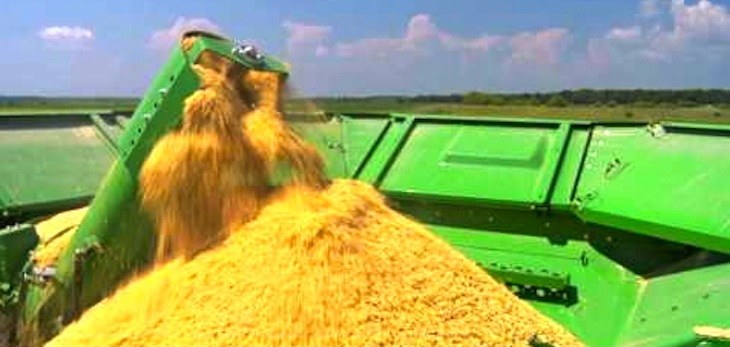Riceland Foods official assesses federal Farm Bill impasse
by June 6, 2018 6:48 pm 961 views

With Congress failing to pass a Farm Bill for the next five years, Arkansas farmers are teetering toward limbo with future farm policy.
In mid-May, the U.S. House of Representatives failed to pass its version of the Farm Bill due to squabbles between Democrats on the Supplemental Nutrition Assistance Program (SNAP) and Republicans on immigration reform. The Senate’s version is still in a committee awaiting action.
Kevin McGilton, vice president for Government Affairs with powerhouse agricultural cooperative Riceland Foods, is tasked with monitoring and hopefully shaping the final Farm Bill legislation. He shared his thoughts on what’s at stake and what happens next with Talk Business & Politics CEO Roby Brock.
Roby Brock: The House Farm Bill did not pass, now what?
Kevin McGilton: I think it’s definitely the time to huddle up for the GOP to see which direction they go from here. Obviously, some decisions are going to have to be made on this bill of how they get it passed. Whether it’s with Democratic help or with help from the far right of the Republican party.
Brock: What do you think were some of the major issues that surrounded the defeat of the bill?
McGilton: I think the major issue was definitely the changes in the SNAP program that the Republicans made, i.e that would be the “fit to work” requirements that they had in the bill. The Democrats on the Ag Committee and then, obviously, the entire caucus there on the Democrats’ side did not support that. So that was the major issue on the Farm Bill.
But what ultimately got it voted down really had nothing to do with the Farm Bill. The Freedom Caucus really wanted a vote on a hard-line immigration bill, and the leadership would not give them that vote in the time that they wanted it, so they took the opportunity to say “No” in the Farm Bill.
Brock: So, really the way for the bill to get back on track is leadership. Speaker Paul Ryan is going to have to pick which side he may want to cut a deal with.

McGilton: I think that’s exactly right. The Democrats after the vote, ranking member Collin Peterson from Minnesota quickly came out and said that he was ready to work with Republicans to make a few changes in the SNAP provisions that were in the bill. He assured them that he could bring many, many Democratic votes if those changes were made. So that’s definitely one path forward.
The other path would be, again, seeing what they could do with the Freedom Caucus about this hard-line immigration bill.
Brock: How unhealthy is it to not have bipartisanship when you’re talking about a Farm Bill? It affects red states and blue states. It affects farmers no matter what their political stripes are. It just seems to me that bipartisanship might be a better solution.
McGilton: One of the beltway news outlets reported today that they went back, and you had to go all the way back to 1965 to find a Farm Bill that passed along party line votes. So that tells me the importance of being bipartisan.
You know, that’s why the Farm Bill is structured the way it is. That’s why you have the nutrition title and the commodity titles in the rest of the Farm Bill as one package, to make sure that you pull those rural congressman in with those urban representatives, so everyone has something to vote for in the bill.
Brock: Now the Senate has a version of the Farm Bill. Where does it stand, and could it be a factor in what’s happening in the House?
McGilton: The Senate Ag Committee has definitely been very busy of late. From conversations that I’ve had with some of our trade associates and representatives in D.C., it sounds like the Senate Ag Committee is definitely putting the final touches on their bill. Expectations would be they possibly could release a draft bill, maybe next week while Congress is out of session. And then they could potentially mark that bill up in the Senate Ag Committee the week of June 4, and then immediately go to the Senate floor on June 11.
Now obviously, there’s nothing about that set in stone, and that definitely could have some slippage to it. [Senate Agriculture] Chairman [Pat] Roberts has said that he is not looking to do anything controversial in the Senate bill. I think his term is, “This is an evolution bill, not a revolution bill.” So, just some changes around the sides to tweak a few of the programs, but nothing major. And he was even quoted last week as saying he wanted a Farm Bill that would pass the Senate with 70 votes. He’s definitely looking to make as many friends as possible on the Senate with the Senate Farm Bill.
Brock: Does this bill being in limbo in both chambers, does this have Arkansas farmers in a holding pattern? How do they proceed when there’s not certainty for what’s going to happen over the next several years?
McGilton: There’s no doubt about that. I think if you’re looking to make some kind of investment on the farm that’s going to tie you up several years into the future, I think you have to hold steady and wait and see what Congress does here. You know, again, both the House Bill and the Senate Bill, from what we know about it today, they look fairly similar to the 2014 Farm Bill, the bill we’re currently working under. So we don’t expect any major changes, especially on the commodity title side. But again, as you know, nothing is done in Washington until it’s done. We would definitely advise folks to hold steady for any major future investments, so you really know what you’re working under.
